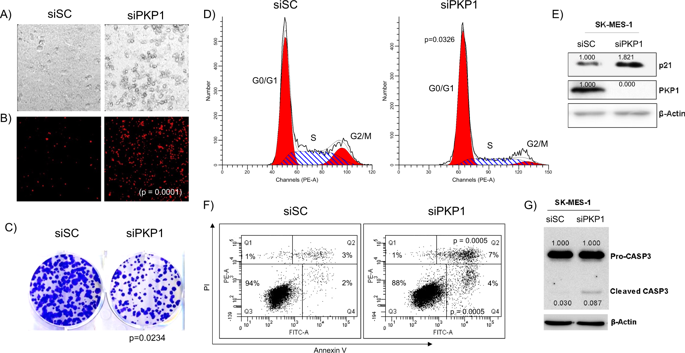Our official English website, www.x-mol.net, welcomes your feedback! (Note: you will need to create a separate account there.)
Plakophilin 1 enhances MYC translation, promoting squamous cell lung cancer.
Oncogene ( IF 8 ) Pub Date : 2019-12-10 , DOI: 10.1038/s41388-019-1129-3 Joel Martin-Padron 1, 2, 3 , Laura Boyero 1, 2 , Maria Isabel Rodriguez 1, 4 , Alvaro Andrades 1, 4 , Inés Díaz-Cano 1, 2, 3 , Paola Peinado 1, 4 , Carlos Baliñas-Gavira 1, 4 , Juan Carlos Alvarez-Perez 1, 4 , Isabel F Coira 1, 4 , María Esther Fárez-Vidal 2, 3 , Pedro P Medina 1, 3, 4
Oncogene ( IF 8 ) Pub Date : 2019-12-10 , DOI: 10.1038/s41388-019-1129-3 Joel Martin-Padron 1, 2, 3 , Laura Boyero 1, 2 , Maria Isabel Rodriguez 1, 4 , Alvaro Andrades 1, 4 , Inés Díaz-Cano 1, 2, 3 , Paola Peinado 1, 4 , Carlos Baliñas-Gavira 1, 4 , Juan Carlos Alvarez-Perez 1, 4 , Isabel F Coira 1, 4 , María Esther Fárez-Vidal 2, 3 , Pedro P Medina 1, 3, 4
Affiliation

|
Plakophilin 1 (PKP1) is a member of the arm-repeat (armadillo) and plakophilin gene families and it is an essential component of the desmosomes. Although desmosomes have generally been associated with tumor suppressor functions, we have consistently observed that PKP1 is among the top overexpressed proteins in squamous cell lung cancer. To explore this paradox, we developed in vivo and in vitro functional models of PKP1 gain/loss in squamous cell lung cancer. CRISPR-Cas9 PKP1 knockout severely impaired cell proliferation, but it increased cell dissemination. In addition, PKP1 overexpression increased cell proliferation, cell survival, and in vivo xenograft engraftment. We further investigated the molecular mechanism of the mainly oncogenic function of PKP1 by combining transcriptomics, proteomics, and protein-nucleic acid interaction assays. Interestingly, we found that PKP1 enhances MYC translation in collaboration with the translation initiation complex by binding to the 5'-UTR of MYC mRNA. We propose PKP1 as an oncogene in SqCLC and a novel posttranscriptional regulator of MYC. PKP1 may be a valuable diagnostic biomarker and potential therapeutic target for SqCLC. Importantly, PKP1 inhibition may indirectly target MYC, a primary anticancer target.
中文翻译:

亲脂蛋白1增强MYC翻译,促进鳞状细胞癌。
Plakophilin 1(PKP1)是arm-repeat(armadillo)和plakophilin基因家族的成员,并且是桥粒的必不可少的组成部分。尽管桥粒通常与肿瘤抑制功能有关,但我们一直观察到PKP1是鳞状细胞肺癌中表达最强的蛋白质之一。为了探索这一悖论,我们开发了鳞状细胞肺癌中PKP1增/减的体内和体外功能模型。CRISPR-Cas9 PKP1敲除严重损害细胞增殖,但增加细胞扩散。另外,PKP1过表达增加细胞增殖,细胞存活和体内异种移植。通过结合转录组学,蛋白质组学和蛋白质-核酸相互作用分析,我们进一步研究了PKP1主要致癌功能的分子机制。有趣的是,我们发现PKP1通过与MYC mRNA的5'-UTR结合,与翻译起始复合体一起增强了MYC翻译。我们提出PKP1作为SqCLC中的致癌基因和MYC的新型转录后调控因子。PKP1可能是SqCLC的有价值的诊断生物标志物和潜在的治疗靶标。重要的是,抑制PKP1可以间接靶向MYC(主要的抗癌靶标)。
更新日期:2019-12-11
中文翻译:

亲脂蛋白1增强MYC翻译,促进鳞状细胞癌。
Plakophilin 1(PKP1)是arm-repeat(armadillo)和plakophilin基因家族的成员,并且是桥粒的必不可少的组成部分。尽管桥粒通常与肿瘤抑制功能有关,但我们一直观察到PKP1是鳞状细胞肺癌中表达最强的蛋白质之一。为了探索这一悖论,我们开发了鳞状细胞肺癌中PKP1增/减的体内和体外功能模型。CRISPR-Cas9 PKP1敲除严重损害细胞增殖,但增加细胞扩散。另外,PKP1过表达增加细胞增殖,细胞存活和体内异种移植。通过结合转录组学,蛋白质组学和蛋白质-核酸相互作用分析,我们进一步研究了PKP1主要致癌功能的分子机制。有趣的是,我们发现PKP1通过与MYC mRNA的5'-UTR结合,与翻译起始复合体一起增强了MYC翻译。我们提出PKP1作为SqCLC中的致癌基因和MYC的新型转录后调控因子。PKP1可能是SqCLC的有价值的诊断生物标志物和潜在的治疗靶标。重要的是,抑制PKP1可以间接靶向MYC(主要的抗癌靶标)。



























 京公网安备 11010802027423号
京公网安备 11010802027423号